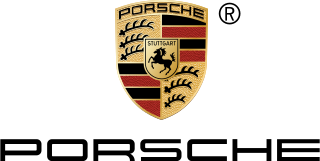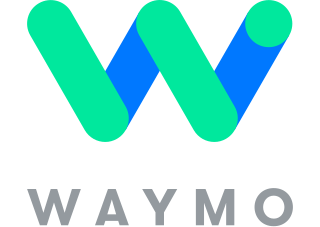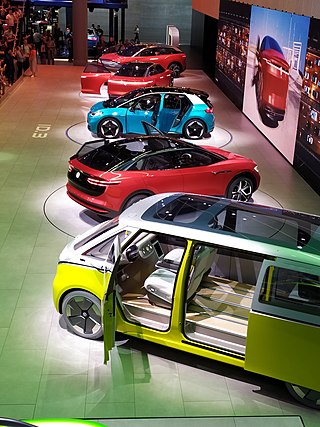
Audi AG is a German automotive manufacturer of luxury vehicles headquartered in Ingolstadt, Bavaria, Germany. A subsidiary of the Volkswagen Group, Audi produces vehicles in nine production facilities worldwide.

Dr. Ing. h.c. F. Porsche AG, usually shortened to Porsche, is a German automobile manufacturer specializing in high-performance sports cars, SUVs and sedans, headquartered in Stuttgart, Baden-Württemberg, Germany. The company is owned by Volkswagen AG, a controlling stake of which is owned by Porsche Automobil Holding SE. Porsche's current lineup includes the 718, 911, Panamera, Macan, Cayenne and Taycan.

Volkswagen is a German automobile manufacturer headquartered in Wolfsburg, Lower Saxony, Germany. Founded in 1937 by the German Labour Front under the Nazi Party and revived into the global brand it is known as today post World War II by the British Army officer Ivan Hirst, it is known for the iconic Beetle and serves as the flagship brand of the Volkswagen Group, the largest automotive manufacturer by worldwide sales in 2016 and 2017. The group's biggest market is in China, which delivers 40 percent of its sales and profits. Its name is derived from the German-language terms Volk and Wagen, translating to "people's car" when combined.

The Volkswagen Golf is a compact car/small family car (C-segment) produced by the German automotive manufacturer Volkswagen since 1974, marketed worldwide across eight generations, in various body configurations and under various nameplates – including as the Volkswagen Rabbit in the United States and Canada, and as the Volkswagen Caribe in Mexico (Mk1).

A self-driving car, also known as an autonomous car (AC), driverless car, or robotic car (robo-car), is a car that is capable of operating with reduced or no human input. Self-driving cars are responsible for all driving activities including perceiving the environment, monitoring important systems, and controlling the vehicle, including navigating from origin to destination.

Adaptive cruise control (ACC) is a type of advanced driver-assistance system for road vehicles that automatically adjusts the vehicle speed to maintain a safe distance from vehicles ahead. As of 2019, it is also called by 20 unique names that describe that basic functionality. This is also known as Dynamic cruise control.

Waymo LLC, formerly known as the Google Self-Driving Car Project, is an American autonomous driving technology company headquartered in Mountain View, California. It is a subsidiary of Alphabet Inc, the parent company of Google.

The Volkswagen Golf (Mk7) is a C-segment car manufactured by German automobile manufacturer Volkswagen. It is the seventh generation in the Golf series and the successor to the Golf Mk6. It was introduced in Berlin on 4 September 2012, before a public launch at the 2012 Paris Motor Show. Sales in Europe began with the model in November 2012.

Mobileye Global Inc. is an Israeli autonomous driving company. It is developing self-driving technologies and advanced driver-assistance systems (ADAS) including cameras, computer chips, and software. Mobileye was acquired by Intel in 2017 and went public again in 2022.

Experiments have been conducted on self-driving cars since 1939; promising trials took place in the 1950s and work has proceeded since then. The first self-sufficient and truly autonomous cars appeared in the 1980s, with Carnegie Mellon University's Navlab and ALV projects in 1984 and Mercedes-Benz and Bundeswehr University Munich's Eureka Prometheus Project in 1987. Since then, numerous major companies and research organizations have developed working autonomous vehicles including Mercedes-Benz, General Motors, Continental Automotive Systems, Autoliv Inc., Bosch, Nissan, Toyota, Audi, Volvo, Vislab from University of Parma, Oxford University and Google. In July 2013, Vislab demonstrated BRAiVE, a vehicle that moved autonomously on a mixed traffic route open to public traffic.
From 2014 until 2024, Apple Inc. undertook a research and development effort to develop an electric and self-driving car, codenamed "Project Titan". Apple never openly discussed any of its automotive research, but around 5,000 employees were reported to be working on the project as of 2018. In May 2018, Apple reportedly partnered with Volkswagen to produce an autonomous employee shuttle van based on the T6 Transporter commercial vehicle platform. In August 2018, the BBC reported that Apple had 66 road-registered driverless cars, with 111 drivers registered to operate those cars. In 2020, it was believed that Apple was still working on self-driving related hardware, software and service as a potential product, instead of actual Apple-branded cars. In December 2020, Reuters reported that Apple was planning on a possible launch date of 2024, but analyst Ming-Chi Kuo claimed it would not be launched before 2025 and might not be launched until 2028 or later.
A robotaxi, also known as robo-taxi, self-driving taxi or driverless taxi, is an autonomous car operated for a ridesharing company.

The Volkswagen emissions scandal, sometimes known as Dieselgate or Emissionsgate, began in September 2015, when the United States Environmental Protection Agency (EPA) issued a notice of violation of the Clean Air Act to German automaker Volkswagen Group. The agency had found that Volkswagen had intentionally programmed turbocharged direct injection (TDI) diesel engines to activate their emissions controls only during laboratory emissions testing, which caused the vehicles' NOx output to meet US standards during regulatory testing. However, the vehicles emitted up to 40 times more NOx in real-world driving. Volkswagen deployed this software in about 11 million cars worldwide, including 500,000 in the United States, in model years 2009 through 2015.

Argo AI LLC was an autonomous driving technology company headquartered in Pittsburgh, Pennsylvania. The company was co-founded in 2016 by Bryan Salesky and Peter Rander, veterans of the Google and Uber automated driving programs. Argo AI was an independent company that built software, hardware, maps, and cloud-support infrastructure to power self-driving vehicles. Argo was mostly backed by Ford Motor Co. (2017) and the Volkswagen Group (2020).

The Volkswagen ID. Buzz is a battery electric minivan produced by German manufacturer Volkswagen. Based on the dedicated battery electric MEB platform, it is the first production electric minivan from Volkswagen and part of the Volkswagen ID. series. The design of the ID. Buzz is inspired by the Volkswagen Type 2 (T1) Microbus.

The Volkswagen Group MEB platform is a modular car platform for electric cars developed by the Volkswagen Group and its subsidiaries. It is used in models of Audi, Cupra, Škoda, and Volkswagen, along with Ford through partnership. The architecture is aimed to "consolidate electronic controls and reduce the number of microprocessors, advance the application of new driver-assistance technology and somewhat alter the way cars are built" by the VW Group.

The Volkswagen ID. series is a family of battery electric cars from Volkswagen (VW), built on the MEB platform that is developed by the Volkswagen Group for a range of electric cars. Deliveries began in late 2020. By November 2022, half a million vehicles have been delivered.

The Volkswagen ID. Vizzion is a concept electric vehicle, part of Volkswagen's ID. project. The firm is planning to sell a production version of the vehicle by 2022. It should be expected that some of the claims of the Vizzion Concept, such as the autonomous level 5 driving, will very likely not make it the final 2022 production version of the vehicle. The Vizzion Concept is more likely to represent what driving in the year 2030 could be like.
Aurora Innovation, Inc., doing business as Aurora, is a self-driving vehicle technology company based in Pittsburgh, Pennsylvania. Aurora has developed the Aurora Driver, a computer system that can be integrated into cars for autonomous driving. Aurora was co-founded by Chris Urmson, the former chief technology officer of Google/Alphabet Inc.'s self-driving team, which became known as Waymo, as well as by Sterling Anderson, former head of Tesla Autopilot, and Drew Bagnell, former head of Uber's autonomy and perception team.
The impact of self-driving cars is anticipated to be wide-ranging in many areas of daily life. Self-driving cars have been the subject of significant research on their environmental, practical, and lifestyle consequences and their impacts remain debated.















